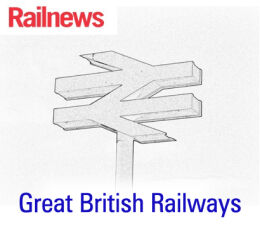Posted 6th November 2025
MPs to debate Railways Bill when time allows

.jpg)
Updated 11 November 08.00
The Railways Bill will be debated in full when Parliamentary time allows, after receiving its formal First Reading in the House of Commons yesterday. The next step is Second Reading, when there will be a full debate.
GBR will take over the railway, replacing Network Rail and most individual passenger operators, except a small number holding open access licences. The remaining former franchises are already being progressively renationalised, following the passing of an earlier Act a year ago.
The Scottish and Welsh operators have already been renationalised by the devolved governments, and the Bill provides for GBR working in partnership with the ministers of those governments.
The next English operator returning to public ownership will be West Midlands Trains on 1 February, followed by Govia Thameslink Railway on 31 May. The Department for Transport intends to complete the renationalisation of the former franchises by later in 2027.
In a written statement, transport secretary Heidi Alexander told MPs: ‘ I am bringing forward legislation that will pave the way for the biggest transformation of Britain’s railways in 30 years. Informed by the consultation feedback, the Railways Bill will give us the tools we need to create Great British Railways—a new, publicly owned company to oversee the management of track and train.
‘Today’s passengers are at the mercy of a complex system of poorly co-ordinated organisations, all incentivised to look inward and outsource blame. GBR will put an end to this by bringing together the work of 17 different organisations—from train operators to public bodies, Government, and the regulator—eliminating unnecessary duplication and creating a single organisation responsible for operating, maintaining, and improving our railways.
’Unencumbered by the bureaucracy and perverse incentives of the old system, GBR will have the tools and authority it needs …’
The Commons Transport Committee has announced an inquiry to scrutinise the Railways Bill, which will examine how GBR will work for passengers, including the regulation of fares and tickets, the role of devolved governments and authorities in running the railways, and how GBR will regulate access to the network, including by freight operators, which are mostly staying in the private sector.
Committee chair Ruth Cadbury said: ‘When all is said and done, what difference will passengers notice? How can we feel confident that these plans, that sound good on paper, will translate into more reliable train journeys and fares that are value for money? These are the questions my cross-party colleagues and I, who are among the most informed on transport policy in the House of Commons, will investigate while reflecting on perspectives from across the sector.
‘We will then seek to make recommendations to the Government, at the most impactful moment, on how the Bill can be improved.’
The future Railways Act has received a broad welcome from many parts of the industry.
Campaigning charity Centre for Cities is calling for the new legislation to clarify how GBR will ensure metro mayors can use their powers more effectively.
Chief executive Andrew Carter said: ‘There are huge economic advantages to be achieved by making better use of big cities’ large existing public transport networks.
‘Flagship Government legislation will soon give metro mayors powers over their local transport networks, giving them the opportunity to deliver what is taken for granted in many cities across Europe and London – an integrated transport system that allows people to move around their cities easily and effectively.’
RMT general secretary Eddie Dempsey said: ‘We welcome the creation of GBR which will bring about a new integrated publicly owned organisation, uniting track and train. This marks the culmination of over 30 years of campaigning against privatisation and fragmentation of our railways.
‘GBR could be a once in a generation opportunity to drive improvements for passengers, workers, sustainable economic growth and improved productivity in our economy.’
Third party ticket retailers are also pleased that their status has been recognised.
The chair of pressure group Independent Rail Retailers Anthony Smith said: ‘The Railways Bill opens the door to reform – and it’s up to all of us across the industry to work together with Government and GBR to shape the future railway this country needs.
’We particularly welcome the Government clearly re-affirming that independent retailers will compete in a “fair and open market” and the explicit recognition of the significant value of independent retailers who “innovate and drive up standards for passengers”.’
However, there are some doubts. The Scottish Government said its ‘position remains that a fully devolved railway is in Scotland’s best interests, and we are disappointed this was not agreed by the UK Government.
‘We support the policy intent of the UK Railways Bill as it seeks to deliver the integration of track and train we have been operating in Scotland for some years and we welcome the opportunity it provides to achieve even greater integration on a statutory, rather than informal, basis.‘
What do you think? Click here to let us know.
